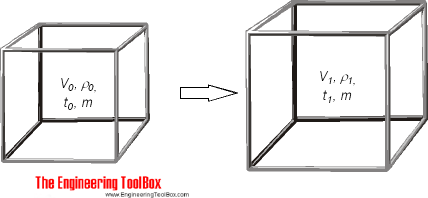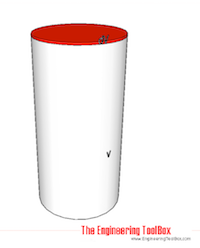Volumetric (Cubic) Thermal Expansion
Volumetric temperature expansion calculator.

Specific volume of a unit can be expressed as
v = 1 / ρ
= V / m (1)
where
v = specific volume (m3/kg, ft3/lb)
ρ = density (kg/m3, lb/ft3)
V = volume of unit (m3, ft3)
m = mass of unit (kg, lb)
The change in the units volume when temperature changes can be expressed as
dV = V0 β (t1 - t0) (2)
where
dV = V1 - V0 = change in volume (m3, ft3)
β = volumetric temperature expansion coefficient (m3/m3 o C, ft3/ft3 o F)
t1 = final temperature (oC, oF)
t0 = initial temperature (oC, oF)
The density of a fluid when temperature changes can be expressed as
ρ1 = m / V0 (1 + β (t1 - t0))
= ρ0 / (1 + β (t1 - t0)) (3)
where
ρ1 = final density (kg/m3, lb/ft3)
ρ0 = initial density (kg/m3, lb/ft3)
Online Thermal Cubic Expansion Calculator - Expansion coefficient and Temperatures
Be aware that the expansion coefficient for some liquids - like water - may vary with temperature. The calculator below is generic and can be used for metric and imperial units as long as the use of units is consistent.
Note that the volumetric expansion coefficient used in the calculator is constant . If you want to calculate volumetric change for a liquid over a temperature range where the volumetric expansion coefficient for the liquid changes a lot - interpolate the coefficient values, or split the calculation in the different temperature ranges. Example - water is a liquid where the volumetric expansion coefficient changes a lot with temperature. Water has its highest density and smallest volume at 4 oC (39.2 oF) . The volumetric coefficient for water is negative below 4 oC and indicates that the a volume decreases when temperature moves from 0 oC ( 32 oF) to 4 oC.
Example - the expansion coefficient for water for the temperature range 20 - 40 oC can be calculated from the values in the list below as
β = ((0.000207 1/oC) + (0.000303 1/oC) + (0.000385 1/oC) ) / 3
= 0.000298 (1/oC)
Online Thermal Cubic Expansion Calculator - Densities
This calculator can be used to calculate expansion volume when initial volume and initial and final densities for the liquid are known
Volumetric Temperature Coefficients - β - for some Fluids
- water at 0 oC : -0.00005 0 (1/oC)
- water at 4 oC : 0 (1/oC)
- water at 10 oC : 0.000088 (1/oC)
- water at 20 oC : 0.000207 (1/oC)
- water at 30 oC : 0.000303 (1/oC)
- water at 40 oC : 0.000385 (1/oC)
- water at 50 oC : 0.000457 (1/oC)
- water at 60 oC : 0.000522 (1/oC)
- water at 70 oC : 0.000582 (1/oC)
- water at 80 oC : 0.000640 (1/oC)
- water at 90 oC : 0.000695 (1/oC)
- ethyl alcohol: 0.00109 (1/oC), 0.00061 (1/ oF)
- oil: 0.00070 (1/oC), 0.00039 (1/ oF)
Convert between Metric and Imperial Volumentric Temperature Coefficients
- 1 (1/oC) = 0.56 (1/oF)
- 1 (1/oF) = 1.8 (1/oC)
Example - Cubic Expansion of Oil

100 liters - 0.1 m3 - of oil with volumetric expansion coefficient 0.00070 1/oC is heated from 20 oC to 40 oC . The volumetric expansion can be calculated using equation (2)
dV = (0.1 m3) (0.00070 1/oC) ((40 oC) - (20 oC))
= 0.0014 m3
= 1.4 liter
The final volume is
100 liters + 1.4 liters = 101.4 liters
Example - Cubic Expansion of Oil
30 U.S. gallons of oil is heated from 70 oF to 100 oF . The volumetric expansion can be calculated using equation (2)
dV = (30 gallons) (0.00039 1/oF) ((100 oF) - (70 oF))
= 0.351 gallons
The final volume is
30 gallons + 0.351 gallon = 30.351 gallons



